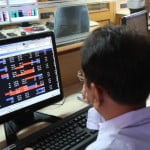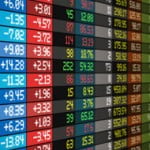High quality global journalism requires investment. Please share this article with others using the link below, do not cut & paste the article. See our Ts&Cs and Copyright Policy for more detail. Email [email protected] to buy additional rights. http://www.ft.com/cms/s/0/371a26a2-016b-11e6-ac98-3c15a1aa2e62.html#ixzz45mwGoucc
 ©Reuters
©ReutersThe performances of European equity and corporate bond markets have diverged sharply this year, underlining that while the European Central Bank has succeeded in driving down the cost of debt doubts remain over whether its measures can help ignite earnings growth for the region’s companies.
A rally in equities so far this week has trimmed losses for the benchmark Stoxx 600 index, but it remains down 6.4 per cent this year. That performance lags behind the total return of 2.7 per cent for the Barclays euro aggregate corporate bond index in 2016.
The gap in part reflects large cuts in profit expectations for leading eurozone companies since the start of the year, as the eurozone economy struggles for traction against a weak global backdrop.
Meanwhile, bond prices have risen following the ECB’s announcement that it will start buying corporate debt in June — its latest effort to kindle inflation and economic growth.
“Fears on quarter one results due to sluggish global growth have hurt European equities in the last couple of months while credit is doing well recently as a direct consequence of European Central Bank policy,” said Daniel Fermon, head of cross asset thematic research at Société Générale.
Few expect first-quarter earnings from European companies to dent the outperformance of corporate bonds given the challenges facing European companies as managements try to improve profits and revenues.
“The market is still questioning whether the ECB’s package will work in terms of stimulating growth and therefore earnings,” said Hani Redha, a multi-asset portfolio manager at PineBridge Investments.
Analysts’ forecast earnings for the first three months of 2016 will drop by 13.1 per cent from the same period last year, according to data gathered by Thomson Reuters. If the energy sector — still adjusting to lower oil prices — is excluded, profits are predicted to fall 5.4 per cent.
The region’s banking sector is a particular cause for concern, with many investors questioning its profitability in a world of negative and ultra-low interest rates and more regulation. Banks are the third largest component of the Stoxx 600, and the banking sub-index has fallen 18.8 per cent this year.

A further headwind comes from a strengthening euro, which has climbed 3.6 per cent versus the dollar this year and is expected to hamper exports. The Stoxx 600 autos and auto parts sub-index, for example, is the second worst performing this year after banks, down 13.6 per cent.
Chris Dyer, director of global equity at Eaton Vance, added that rising political populism in Europe was providing a “tremendous amount of uncertainty”, with both Spain and Ireland unable to form a government and the Netherlands rejecting a potential trade deal between the EU and Ukraine in a referendum.
“The equity market is exercising a strong degree of caution, particularly until we get past the Brexit vote,” he said.
Copyright The Financial Times Limited 2016. You may share using our article tools.
Please don’t cut articles from FT.com and redistribute by email or post to the web.
[“source-Business2community”]





